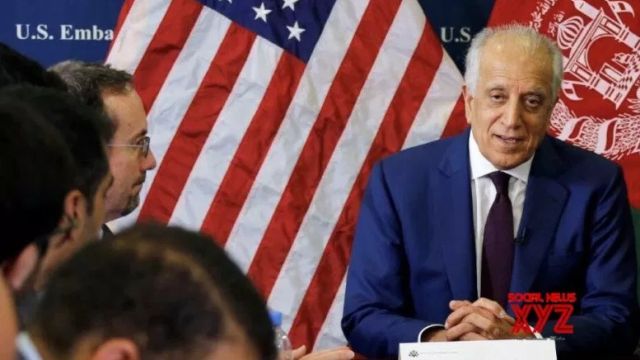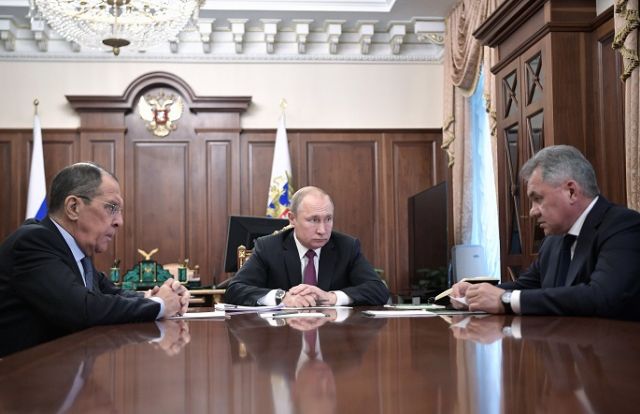
by admin | May 25, 2021 | World
 United Nations : The UN Security Council has failed to adopt two competing draft resolutions on Venezuela, sponsored by the US and Russia respectively.
United Nations : The UN Security Council has failed to adopt two competing draft resolutions on Venezuela, sponsored by the US and Russia respectively.
The US draft received nine votes in favour, three against, and three abstentions in the 15-member council, on Thursday. Russia and China, as well as South Africa, vetoed the resolution, Xinhua reported.
Minutes later, the Security Council voted on the Russian draft, which received four votes in favour, seven against and four abstentions.
The US draft stresses the need to prevent further deterioration of the humanitarian situation in Venezuela and to facilitate unhindered access and delivery of assistance to all in need in the entirety of the territory of Venezuela in accordance with humanitarian principles.
The Russian draft, on the contrary, calls that international assistance should be provided with the consent of, and on the basis of an appeal by, the government of Venezuela. It also urges the settlement of the current situation through peaceful means and supports all initiatives aimed at reaching a political solution among Venezuelans.
Thursday’s Security Council meeting is the third on the situation in Venezuela in just over a month due to the escalation of political tension facing the Latin American country.
Vassily Nebenzia, Russia’s permanent representative to the UN, said that the meeting “may be exploited as a step for preparations of a real, not humanitarian, intervention,” adding that it may cause the alleged inability of the Security Council to resolve the situation in Venezuela.
“At the Security Council, on the Venezuelan issue, our starting point is to uphold the spirit of the UN Charter and the basic principles governing international relations, promote a peaceful settlement of the Venezuelan issue and maintain long-term peace, stability and development in Latin America,” said Wu Haitao, China’s deputy permanent representative to the UN.
China opposes external forces interfering in Venezuela internal affairs and opposes military intervention in Venezuela, he stressed.
Venezuela has been plunged into a political crisis since January 23 when National Assembly President Juan Guaido declared himself interim president and was recognized by the United States and some other countries.
A US-backed drive to deliver “humanitarian aid” to Venezuela through border crossings on February 23 met strong resistance from the Venezuelan government as President Nicolas Maduro believed the aid, mainly from the US, is a smokescreen for a military invasion.
The Venezuelan government has closed borders with Brazil and Colombia and some air and sea routes.
—IANS

by admin | May 25, 2021 | Branding, Markets, Networking, Online Marketing, Social Media, Technology, World
 Moscow : Russian telecom watchdog Roskomnadzor has said that it will punish Twitter and Facebook if they decline to move the database of Russian users to Russia.
Moscow : Russian telecom watchdog Roskomnadzor has said that it will punish Twitter and Facebook if they decline to move the database of Russian users to Russia.
“The companies will either have to localise the databases within a certain period of time, which I suppose will be about nine months, or they will be punished,” Roskomnadzor head Alexander Zharov was quoted as saying by Xinhua news agency on Tuesday.
He expects Twitter and Facebook representatives to meet with Roskomnadzor officials in Moscow by the end of February to discuss the issue.
Russian legislation requires Internet service providers to store and process personal data of Russians on the territory of Russia.
Roskomnadzor has the right to impose fines on or even block Internet companies for their violations.
In December, it fined Google 500,000 rubles (around USD 7,625) for failing to remove search links to banned information.
Last year, Roskomnadzor attempted to block instant messaging app Telegram in Russia due to its refusal to provide user data, but failed for technical reasons.
—IANS

by admin | May 25, 2021 | Muslim World, Opinions
 By Saeed Naqvi,
By Saeed Naqvi,
Two parallel peace processes on Afghanistan are underway. In Doha, Zalmay Khalilzad, US Special Representative for Afghanistan, has held extensive round of talks with Taliban leaders, spread over several days last month. The authorship of this process is, quite jealously, America’s. But on February 5 and 6, Taliban and other Afghan political groups also met in Moscow. A roadmap for the future, titled the Moscow Declaration, was announced. Among its nine points is one which also suggests coordination with the Doha process – there is no jealous guarding of ownership of the peace process here. Anyone interested in peace is the joint author. The Declaration was immediately rubbished by the Presidential Palace in Kabul. “Moscow declaration will not have impact on the peace process in Afghanistan,” said palace spokesman Haroon Chakhansuri.
There are, meanwhile, doubts in many capitals on whether the US is truly contemplating total withdrawal. To some extent these doubts are a function of Donald Trump’s confusing statements and tweets. Take his recent statement in Iraq. His troops in Iraq will enable him “to keep a check on Iran”, something way outside the US-Iraq agreement. In Afghanistan too, while Khalilzad is ploughing the furrow promising one kind of crop, his President makes a totally confusing statement. Trump says he will leave behind in Afghanistan “intelligence elements”. How many?
I have Russian estimates of five years ago. They may have changed, but in those days the Russians were convinced of 30 US bases in Afghanistan.
Of these, the ones at Bagram, Jalalabad, Kandahar, Helmand, Shindand (Herat) and Mazar-e-Sharif were, by the sheer volume of masonry and architecture, not temporary. These bases will remain. Are we then talking about a qualified departure?
If the US is actually planning departure, why would it build a consulate in the heart of Mazar-e-Sharif on a scale which would dwarf large embassies? Renaissance is the only reasonable hotel in Mazar-e-Sharif.
It does not take long for great powers to develop more than one point of interest once they have entered an area of strategic significance. It would therefore be fanciful to imagine an America-free Afghanistan in the foreseeable future. “All this blood and treasure was spent for what?” some Americans will ask. Also the chant in Kabul once was “We must remain in the vicinity to keep a watch on the world’s only Muslim nuclear state.”
After Obama announced in a speech delivered on December 1, 2009 US intention to leave Afghanistan in July 2011, I had argued in a paper for the Observer Research Foundation that Americans can simply not leave Afghanistan. I have been proved right so far. And now once again the “We are leaving” story has been let loose. True, this time the circumstances are different, but let us take a look.
Last July, Zalmay Khalilzad, and Morgulov Igor Vladimirovich, Russia’s Deputy Minister for Foreign Affairs, (who was behind the scene in the Intra-Afghan dialogue in Moscow on February 5 and 6) attended a high-power meet in New Delhi on Regional Issues.
In a more cooperative world order, one would have expected the representatives of the US and Russia to exchange notes on Afghanistan. What transpired was to the contrary. Vladimirovich made an allegation that startled the gathering. “ISIS fighters were being flown to Northern Afghanistan” from Syria. The Afghan air space is under the control of the US and the government in Kabul. “So, who is responsible?” Khalilzad offered a tepid denial. The denial lacked credibility because the Russian allegation had been preceded by another made by Iran’s supreme leader, Ayatullah Khamenei. In the course of his Friday address in January 30, 2018. Khamenei said: “The US transfer of IS terrorists to Afghanistan is aimed at creating a justification for its (US’) continued presence in the region.”
In countries surrounding Afghanistan, doubts about American intentions may be more muted but are quite as strong. It is deeply ironical that Jehadism, terrorism and Islamism manufactured in Afghanistan to fight the Soviets in the 80s may be returning to complete the circle. Indeed, there is a certain inevitability about Islamic militancy becoming a tool of American foreign policy. The triangular romance between Washington, Tel Aviv and Riyadh will ensure this state of affairs for as long as this romance lasts.
Let me explain the inevitability. When Animal Rights groups forced the famous annual fox hunt to stop in South India’s most Anglaise hill station, Ooty, I expressed my curiosity to the master of the Hunt: “What have you done to the hundreds of hounds of high pedigree trained diligently for the Hunt.” The lovely canines had been transferred to an expensive kennel from where dog lovers could acquire them.
So now we know what to do with redundant foxhounds of high pedigree. But what does a state like Saudi Arabia do with spare Islamic militants who have been heavily equipped and trained to kill at the cost of billions? They can only be relocated to newer theatres of conflict like Afghanistan. From here they can plague all the countries the US wishes to destabilize – Xinxiang in China, the Caucasus in Russia, Iran and Pakistan too if it does not behave according to the US diktat.
To make confusion worse confounded, Erik Prince, founder of the world’s biggest mercenary military company, which has mutated from Blackwater to Academi and Triple Canopy, is back in Afghanistan floating the idea of US troops to be replaced by Prince’s mercenary army. His plan that Afghanistan be administered by a “Viceroy” was shot down by National Security Adviser H.R. McMaster and Defence Secretary James Mattis. After the two were shown the door, Prince has been all over Afghanistan again in and Khalilzad’s notice. The only person who has refused to meet him in Kabul is President Ghani.
(Saeed Naqvi is a commentator on political and diplomatic affairs. The views expressed are personal. He can be reached on saeednaqvi@hotmail.com )
—IANS

by admin | May 25, 2021 | World

Vladimir Putin (center)
Moscow : Russian President Vladimir Putin on Saturday announced that Russia will suspend its participation in the Intermediate-Range Nuclear Forces (INF) Treaty in a mirror response to the US’ decision.
“We will proceed as follows. We will come up with a tit-for-tat response. American partners have announced the suspension of their participation in the treaty, and we are suspending it as well,” Putin said at a meeting with Russian Foreign Minister Sergei Lavrov and Defence Minister Sergei Shoigu, according to a Kremlin transcript, Xinhua reported.
The US administration announced on Friday that the US is withdrawing from the INF Treaty with Russia within six months, starting from February 2.
Noting that the US has begun developing and manufacturing weapons, Shoigu proposed to develop new arms including ground-based complexes of hypersonic medium-range and shorter-range ballistic missiles. Shoigu’s proposal has Putin’s support.
“They announced that they (the US) are engaged in research and development work, and we will do the same,” Putin said.
The president requested more information on the execution of Russia’s state defence programmes, including the Dagger hypersonic air-launched ballistic missile, the Peresvet combat laser systems, the newest Avangard hypersonic missile defence system and the Sarmat missile.
He also noted that some countries are starting to deploy weapons in space, saying that it is necessary to come up with certain plans to counter this “possible threat.”
Despite the retaliatory measures, Russia will not be dragged into an arms race, Putin said.
“I want to draw your attention to the fact that we should not and will not be drawn into an expensive arms race,” he told the ministers.
The INF Treaty was signed in 1987 between the then Soviet Union and the US on the elimination of intermediate-range and shorter-range missiles.
Moscow and Washington have been accusing each other of violating the agreement in recent years amid increasing tensions.
In October, US President Donald Trump said Washington would pull out of the INF Treaty on account of Russia’s alleged breach of the agreement, a charge which Moscow has repeatedly denied.
—IANS

by admin | May 25, 2021 | World
 Moscow : Russia will not attend the Warsaw Conference on the Middle East, to be organized by the United States and Poland on February 13-14, as the event agenda failed to cover all problems of the region, particularly the Palestinian cause.
Moscow : Russia will not attend the Warsaw Conference on the Middle East, to be organized by the United States and Poland on February 13-14, as the event agenda failed to cover all problems of the region, particularly the Palestinian cause.
“We perceive with concern the continued US attempts to impose its unilateral geopolitical interests through initiatives presented as the opinion of the entire international community,” the Russian Foreign Ministry said in a statement on Tuesday.
“Following a thorough analysis of the provisional agenda and program of this conference provided by the organizers, Russia has decided not to attend,” it said.
The ministry complained that the Warsaw conference will not cover basic problems in the Middle East, particularly the Arab-Israeli conflict and its core element, the Palestinian issue. It added that the meeting has been arranged “hastily and behind closed doors,” without due regard for the opinions of influential states in the region and beyond.
Also in the statement, Russia underlined the need to find compromise solutions to problems with the help of the United Nations and based on international law instead of promoting unilateral approaches.
—AB/UNA-OIC

 United Nations : The UN Security Council has failed to adopt two competing draft resolutions on Venezuela, sponsored by the US and Russia respectively.
United Nations : The UN Security Council has failed to adopt two competing draft resolutions on Venezuela, sponsored by the US and Russia respectively.



